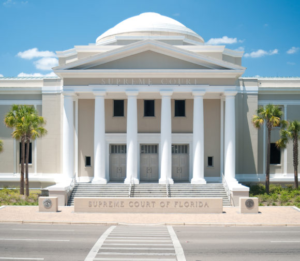by Allan J. Rotlewicz & Stephanie A. Calcote, Esqs.

The Florida Supreme Court
On January 21, 2021, the Supreme Court of Florida issued an important decision in Citizens Property Insurance Corp. v. Manor House, LLC, et. al., SC19-1394 (Fla. 2021), disallowing an insured to recover extra-contractual, consequential damages in a first-party breach of contract action. The Supreme Court of Florida quashed the Fifth District Court of Appeal’s ruling and held that an insured cannot recover extra-contractual, consequential damages in a breach of contract action.
Citizens Property Insurance Corp., a government entity, insured several apartment buildings owned by Manor House. Citizens is statutorily immune from first-party bad faith claims. In 2004, Manor House filed claims under Citizens’ insurance policy for hurricane damage to the apartments. Citizens investigated the claims and made certain payments.
Manor House filed suit against Citizens alleging breach of contract and fraud. The lawsuit alleged Citizens failed to timely pay the appraisal award, failed to properly adjust the loss, and failed to pay the undisputed amount. The policy did not cover loss of rental income and Manor House sought extra-contractual damages related to lost rent caused by Citizens’ alleged failures.
The trial court granted Citizens’ motion for summary judgment and found that nothing in the insurance contract outlined coverage for lost rental income, and therefore, there is no coverage for lost rent as a matter of law. Manor House appealed this ruling arguing that it was prevented from pursing a claim for extra-contractual, consequential damages. The Fifth DCA agreed with Manor House and reversed the partial summary judgement regarding the consequential damages claim. The Fifth DCA held that the parties should have contemplated these consequential damages at the inception of the contract and the parties can “‘contemplate’ remedies outside the insurance policy’s express terms.” Interestingly, the Fifth DCA agreed that Citizens was a government entity immune from bad faith claims, but found that the consequential damages Manor House sought were of a different variety, allowed in a breach of contract action. It appeared as though Manor House had successfully found a way to recover extra-contractual damages from an entity immune from a bad faith claim.
The Florida Supreme Court found otherwise, and held that an insured cannot recover extra-contractual, consequential damages in a first-party breach of insurance contract action. The Supreme Court reasoned that in a breach of contract action, the contractual amount due to the insured is the amount owed pursuant to the express terms and conditions of the policy. Bad faith claims are the sole vehicle the Legislature intended for extra-contractual damages. The Supreme Court noted the express terms of Citizens’ policy did not outline coverage for lost rental income and that the Fifth DCA’s decision was premised on the conclusion that parties to a contract can contemplate remedies outside the insurance policy’s express terms, a conclusion the Supreme Court disagreed with.
This decision establishes that extra-contractual, consequential damages cannot be recovered in a first-party breach of contract action and are limited to a bad faith lawsuit under Florida Statute 624.155.
Allan Rotlewicz is the former General Counsel to Anchor Insurance, a regional P & C carrier. He is now a Partner with RumbergerKirk focusing his practice on insurance coverage and casualty defense. He also provides outside general counsel services for Florida carriers. RumbergerKirk provides litigation and counseling services in a wide range of civil practice areas including product liability, commercial litigation, construction, real estate, intellectual property litigation, securities litigation, labor and employment law, bankruptcy, insurance coverage, professional liability, and administrative law. Offices are located in Orlando, Tampa, Miami, Tallahassee and Birmingham, Alabama. For more information, please visit www.rumberger.com
LMA Newsletter of 2-1-21

